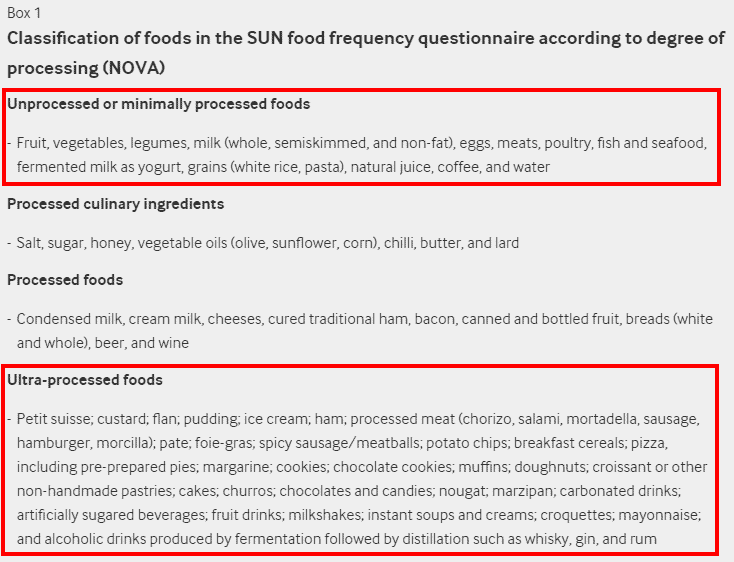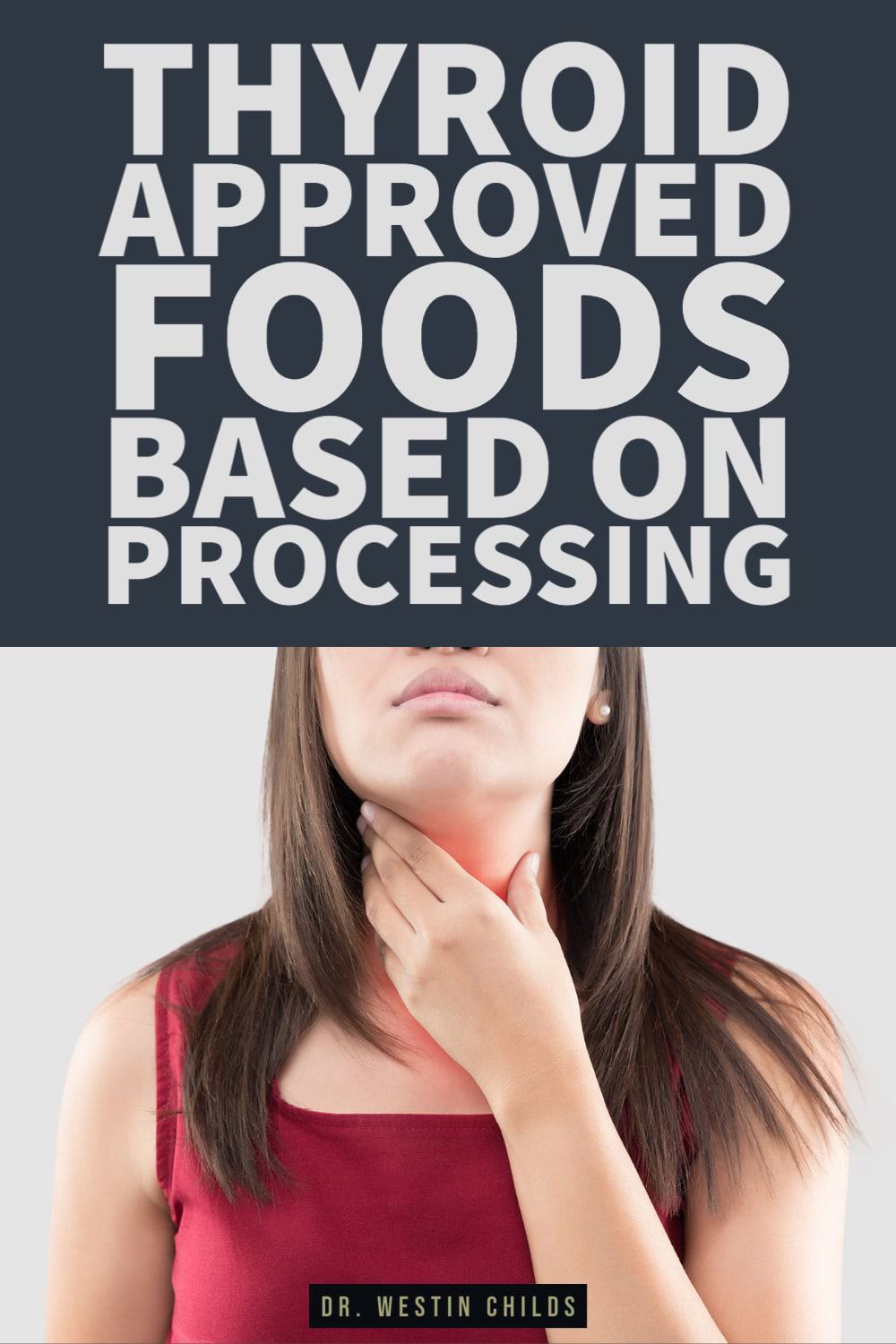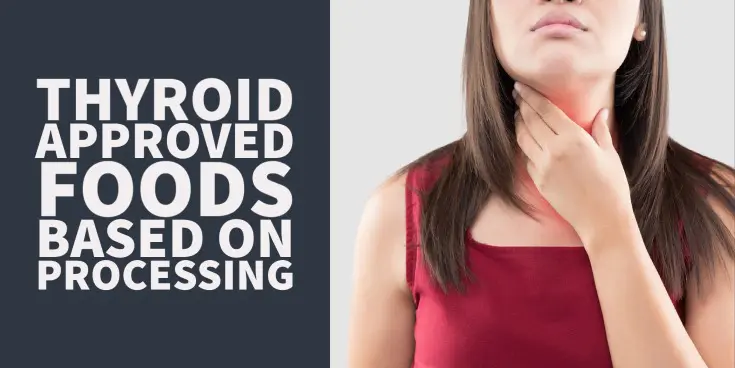I’ve spent a lot of time discussing the importance of the foods that you eat and their connection with your thyroid in the past.
Today, I want to expand on that conversation and discuss how the processing of certain foods can cause not only damage to your thyroid but to your general health as well.
This processing ‘feature’ of food, as you will see, can be used as a proxy for whether food is healthy or unhealthy and is a great tool for thyroid patients.
As always, we will also explore some modifications that should be made if you have thyroid disease as it pertains to your diet and the specific food groups that you consume.
Healthy Foods Based on Processing
Can the food you put in your mouth impact your thyroid function?
The answer is yes and that’s exactly what we are going to discuss today.
This guide will be directed at those thyroid patients who fall into the beginner to intermediate category as it relates to their thyroid function but it should also be helpful even if you have an advanced understanding of diet and how it impacts your hormones/thyroid.
We are going to draw most of our information from a study that was published on May 29th, 2019 in the British Medical Journal and you can read the entire study here if you are so inclined (1).
This study followed close to 20,000 people over 14 years and found that there was a high association between the consumption of heavily/ultra-processed foods and your risk of death from all causes.
So what can a study that isn’t specific to thyroid patients tell us about what you should be eating or not be eating as a thyroid patient?
A lot, actually.
Even though the focus of this study focuses on processed foods and how processed foods impact mortality (your risk of dying from all causes) it is still relevant to thyroid patients for many reasons.
Some of the more important reasons include:
- Processed foods may cause gut damage (2) leading to decreased thyroid function
- Processed foods may increase your risk of developing autoimmune diseases (remember: the #1 cause of thyroid disease is autoimmune thyroiditis)
- Processed foods may result in inflammation (3) and thus worsen thyroid function through T4 to T3 conversion inhibition (4)
- Processed foods may be low in specific micronutrients (5) (such as iodine) which limit thyroid function and lead to minor nutrient deficiencies (6)
- Processed foods lead to weight gain (7) which directly inhibits thyroid function (8)
The processing of foods refers to “foods” which have been created or processed to the point that they contain little if any real food.
This processing usually results in the addition of salt, sugar, oil, and fats which replace the real food and extend the shelf-life of the food.
Processed foods contain very few real ingredients, they are devoid of nutrients, and are incredibly energy dense (packed with calories).
You can see a list of foods that fit into the unprocessed/minimally processed and ultra-processed categories below:

Foods that are unprocessed or minimally processed in this study include:
- Fruit, vegetables, legumes, milk (whole, semi-skimmed, and non-fat), eggs, meats, poultry, fish and seafood, fermented milk as yogurt, grains (white rice, pasta), natural juice, coffee, and water.
Foods to avoid as much as possible if you have thyroid disease include:
- Ice cream, ham, processed meats (chorizo, salami, sausage, hamburger), spicy sausage/meatballs, potato chips, breakfast cereals, pizza including pre-prepared pies, margarine, cookies, chocolate cookies, muffins, doughnuts, croissants, and other non-handmade pastries, cakes, churros, chocolates and candies, nougat, carbonated drinks, artificially sugared beverages, fruit drinks, milkshakes, instant soups and creams, croquettes, mayonnaise, and alcoholic drinks produced by fermentation.
While this list can act as a great starting point, we still need to make some modifications to direct it to thyroid patients.
But, even if you didn’t want to make any modifications, these food groups would be better than eating the “Standard American Diet”.
DOWNLOAD FREE RESOURCES
Foods to Avoid if you Have Thyroid Problems:
I’ve found that these 10 foods cause the most problems for thyroid patients. Learn which foods you should avoid if you have thyroid disease of any type.
The Complete List of Thyroid Lab tests:
The list includes optimal ranges, normal ranges, and the complete list of tests you need to diagnose and manage thyroid disease correctly!
Using This Information as a Thyroid Patient
While this information is not necessarily specific to thyroid patients, we can still extract a great deal of value from it.
The processing of foods has an important and noticeable negative impact on quality of life and health and we can use this information to our advantage.
What you will find, though, is that thyroid patients also have some other unique issues and circumstances which can allow for further modification of these “dietary guidelines”.
Furthermore, it’s important to understand that diet is a fluid concept.
This means that you are going to need to change it based on YOUR needs and YOUR medical conditions.
For instance:
It’s possible to have thyroid disease and other co-existing conditions which complicate the picture.
With this in mind, let’s dive into some modifications that can be made to this dietary list.
Note that these modifications are based on my personal experience and some clinical data, when relevant.
Unfortunately, there aren’t many clinical studies that we can draw from which are specific to patients with thyroid disease.
Modifier #1: Eating Organic & Grass-fed/wild caught
The relative degree to which your food is processed is a good indicator of whether that food is “healthy” or not but it’s not the only indicator.
Another measure would be the overall quality of the food that you are consuming.
And when it comes to quality you want to think about the food that you are consuming and the environment in which it was grown/raised.
Organic sources of good tend to be of better quality compared to mass-manufactured sources.
And this quality actually matters, especially for thyroid patients.
Some newer studies (from 2017) show that organic sources of good tend to have a higher antioxidant count, lower pesticide levels, and a higher omega-3 fatty acid concentration compared to non-organic foods (9).
Why would you want to avoid pesticides?
One reason, among many, has to do with the fact that they have been shown to reduce the half-life of thyroid medication which would render your dose less effective (10).
In addition, other studies have shown that consuming organic foods is associated with a lower rate of obesity (11).
This doesn’t mean that eating organic food will help you lose weight but it does mean that there is something to organic food which makes it different from non-organic varieties.
I believe that this “something” that organic food contains that non-organic food does not has to do with the overall quality of the food.
But let’s forget the science for a minute (even though it is important) and talk about the patient experience.
I have had the opportunity to treat hundreds of patients and I’ve recommended various diets.
My experience has been that thyroid patients tend to improve when consuming organic foods vs non-organic foods.
They report this improvement in their symptoms and how they are feeling overall.
Does this mean that going organic is important for everyone?
Not necessarily, but it’s certainly something that you should look into as a thyroid patient, especially if you are suffering from inflammation, autoimmune disease, obesity, and so on.
Modifier #2: Legumes
Legumes, which are technically unprocessed, can still promote problems for some thyroid patients.
The reason for this is likely two-fold:
Legumes can potentially contain compounds known as goitrogens.
Goitrogens are compounds that can negatively impact thyroid function by blocking the uptake of iodine into your thyroid gland (12).
They are found in all types of foods (in various amounts) and in the environment.
But just because they have the ability to block iodine uptake does not mean that they have a noticeable and negative impact on your thyroid function.
It turns out that this effect is probably mediated based on your exposure to the goitrogen in question.
For instance:
Consuming 1-2 servings of legumes a week is not likely to have any noticeable negative impact on your thyroid.
But if you suddenly started eating 3-5 servings of legumes each day then that might be a different story.
Your relative sensitivity to legumes and their goitrogenic effect will likely be unique to your body.

And second, legumes contain compounds known as lectins (13).
Lectins are compounds found in various foods and they can potentially exert a negative effect on the body and immune system.
You can think of lectins as the plant’s way of “fighting back” after it has been eaten.
Lectins have been shown to disrupt the gastrointestinal epithelial barrier (which keeps your body from absorbing pathogens and bad bacteria), disrupt your digestive system, and result in micronutrient deficiencies.
Because of their impact on the body, lectins have been implicated in the etiology of autoimmune disease (14) and may also cause intestinal distress including nausea and diarrhea.
Like the goitrogenic effects of legumes, your sensitivity to the lectins found in legumes will vary dramatically from the next person.
Your best bet here is to exercise caution when introducing legumes into your diet and to be mindful of how you feel (both from a thyroid standpoint and a gastrointestinal standpoint).
Modifier #3: Dairy
From the list above you will see that milk makes the list of relatively unprocessed foods.
But, despite it being on the list, doesn’t necessarily mean that you should consume dairy.
Dairy contains a combination of both sugars and proteins which can cause negative reactions in many people but particularly those with thyroid disease.
In fact, a recent study has shown that removing milk from the diet of certain Hashimoto’s patients resulted in a natural improvement of their thyroid function and a reduction in TSH (15) (good in this case).
But, how do you know if you should consume it or not?
This is where it can get a little bit tricky.
Milk products do contain a number of beneficial micronutrients, especially the fermented variety of milk such as kefir, and can be a great tool for some people provided they can tolerate the dairy.
If you are someone who has already been eating healthy for some time (more than 3-6 months) and has been dairy free for that time, then you are in a position where trialing a small amount of milk may be appropriate.
If, on the other hand, you are someone who has been eating a number of processed foods on a daily basis and is suffering from current inflammation or GI issues then it’s probably safer for you to avoid dairy for several months.
From there you can then try a small amount to see if you tolerate it.
Modifier #4: Finding a Balance
This isn’t necessarily a modifier of the foods that you eat but a recommendation to make sure that you exercise moderation in your diet.
What does this mean?
It means that you eventually you will probably eat some of the foods listed in the processed food category.
After all, who doesn’t like the occasional cookies or cake for celebratory purposes?
It would be crazy to think otherwise, and, honestly, probably unhealthy to restrict your diet to only those listed in the minimally processed category.
If, and when, you go down this route you want to make sure that the choices you make are the best for you.
That means ensuring that you eat the healthiest version of the “cheat” foods that you are going to partake in.
Instead of buying one of those pre-made frozen cheesecakes try to create your own from scratch using high-quality ingredients.
If you can’t do that then at least try a product that uses the least amount of ingredients and contains as many whole foods as possible.
If you can find a treat/snack which uses coconut oil instead of safflower oil, for instance, then that would be your best option.
The study that I am referencing in this article states that the more of these heavily processed foods that you consume on a daily basis, the more likely you are to experience issues (an increase in all-cause mortality in this case but it can be extended to inflammation and so on).
This doesn’t mean they need to be avoided 100% but instead, do your best to avoid them whenever possible.
When finding a balance, I think it’s a good idea to consider the 80:20 rule (16).
This rule, as it relates to your diet, allows for healthy eating 80% of the time and some indulgences the other 20% of the time.
The logic is that the 80% of healthy eating is enough to negate any negative outcomes from the other 20%.
And, like most things in life, there are diminishing returns as you progress from 80:20 to 90:10 and so on.
Meaning, as you eat healthy 90% of the time the benefits that come from this extra 10% may not necessarily be worth the extra effort.
In addition, the 20% of eating other less healthy foods provides variety to your life which can help you stay on your diet long-term.
The 80:20 rule is just a guideline, though, so just realize that you may need to eat closer to 90% or more depending on your situation.
Modifier #5: Grains/Fruit and Carb Intake
One thing you will notice on the list of unprocessed foods is the category of fruit and even grains such as rice.
For many of you, especially those who are overweight, the term carbohydrate has become synonymous with insulin and high blood sugar and is, therefore, something to be avoided.
But is this really true?
As much as I am a fan of treating insulin resistance to promote weight loss, I don’t think that all starches and carbohydrates are created equal and cause the same amount of harm to the body.
I have placed many thyroid patients on what would be considered high-carbohydrate diets (even in the face of existing insulin resistance) with great success.
On the flip side, I’ve also placed an equal number of insulin-resistant hypothyroid patients on low carbohydrate diets ranging from high fat low carb to the ketogenic diet with great success.
The point I am trying to make is that not all carbohydrates, even those found in fruits and rice, are necessarily harmful.
It has been shown, for instance, that high-sugar fruits have an anti-obesity-like effect (17).
This effect is probably mediated through fruits’ ability to help reduce total caloric intake naturally, their ability to induce satiety, their high micronutrient profile, and their modulation of gut microbial concentration.

The amount of carbohydrates that you can consume as a thyroid patient is dependent upon your genetic makeup (some people simply tolerate them better than others), other hormone imbalances you may have (insulin resistance and leptin resistance being the two big ones), how much stress you are under, and your existing weight.
A word of caution, however:
If you elect to consume foods that are naturally high in sugar (such as some fruits) then beware to also avoid consuming large amounts of fat (this includes healthy fats as well).
Don’t be afraid to play around with your carbohydrate intake but make sure that you closely monitor your thyroid symptoms, thyroid lab tests, and your overall quality of life as you do so.
Modifier #6: Coffee
Coffee makes the list of unprocessed foods but it does carry some risks that you should be made aware of if you have thyroid problems.
I’ve written about coffee in the past and I’ve even placed it on the top 10 thyroid foods to avoid list, but I will elaborate on it here as well.
Why is coffee potentially hazardous if you have thyroid disease?
For several reasons:
#1. It may reduce the absorption of thyroid medication.
Coffee contains the stimulant caffeine and caffeine has the effect of speeding up your intestinal tract.
This speeding up usually results in a bowel movement (which is why so many people have bowel movements after their morning coffee) but it also delays the time that your medication sits in your GI tract.
The less time it remains there the less likely you are to absorb all of it.
#2. It may reduce TSH and result in decreased T3 and T4 levels (18).
Next is that there have been some experimental studies (not done in humans) that show that coffee may result in depressed TSH and free thyroid hormone levels.
This would be concerning for people who take thyroid medication and for those who don’t as it may mean that something in the coffee is suppressing pituitary function in some way.
Whether or not this effect does occur in humans and to what degree, still remains unknown but it’s something to consider.
#3. It may put extra stress on your adrenal glands.
Lastly, coffee, because it contains caffeine, can put extra stress on your adrenal glands by causing the release of adrenaline.
Coffee stimulates the release of these catecholamines which then cause such changes as improved mental cognition, increased heart rate, and increased blood pressure.
These are the reasons that so many people drink coffee daily but just realize that these effects don’t come without a cost.
Recurrent stress on your adrenal glands may lead to increased fatigue, crashes in the mid-day, difficulty sleeping, thyroid dysfunction, and weight gain.
Your Next Steps
Diet is an exceedingly difficult and controversial topic but it’s nonetheless very important to talk about.
While the topic can be incredibly complex, I hope that this information was created in a way that is relatively easy to understand.
Don’t let your confusion about your diet paralyze your actions and prevent you from doing anything!
Changing and altering your diet can have a very positive impact on your overall health and thyroid function.
If you’ve read this and still aren’t sure what to do, then please seek out these resources below for more information:
Don’t be afraid to play around with your diet and the foods that you consume and don’t be alarmed if it takes you some time to figure out what you should and shouldn’t be eating.
If you’ve already tried, however, for several months without any success then it may be time to seek professional health from a knowledgeable physician or from a nutritional coach/adviser.
Now I want to hear from you:
Have you already tried to cut down on the processed foods that you consume?
If so, have you noticed a difference? Positive or negative?
Did any of the modifiers stand out to you?
What changes, if any, do you plan on making after reading this information?
Leave your questions or comments below!








